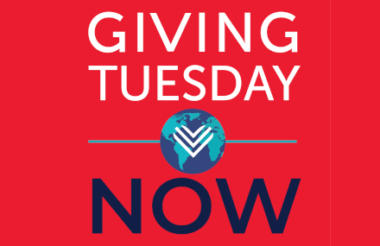Amid all of the upheaval facing civil society, both in the UK and around the world, any sliver of good news demands a strong, albeit virtual, embrace.
A week ago, on 5 May, #GivingTuesdayNow provided us with that moment. One day, hastily pulled together, that managed to mobilise thousands of charities and businesses to say thank you to volunteers, key workers, charities and their supporters. A top trend on Twitter, 90,000 messages of goodwill and one clear message of gratitude and unity.
This special #GivingTuesdayNow came about in consultation with our colleagues around the world, eager to act quickly but aware how strained resources were amid the crisis.
With a strong network of cooperation already in place, this day was about tapping into our collective power in order to create, in just a few short weeks, momentum that would remind people of the charities working so hard in the face of Covid-19. Our American friends, who first created Giving Tuesday in 2012 as an antidote to the shopping sprees of Black Friday, were looking to harness that power to maximum effect and here in the UK, we needed to assess how this might work for our many partners – in charities, government and business. It had to be meaningful rather than merely symbolic. It also need to be straight-forward, low maintenance and quick.
The calamitous impact of the pandemic on the spring fundraising season was a clear starting point and, here at CAF, our decision to partner with the 2.6 Challenge which was timed with the cancelled London Marathon also served as our #GivingTuesdayNow starting pistol.
The push to find a creative way to make up some of the shortfall in sponsorship events gave us the ideal moment to project our #GivingTuesdayNow message of thanks and unity – for those who continue to support the causes close to their heart, but also for the people on the frontlines of this battle every day.
CAF has led the Giving Tuesday movement in the UK since 2016 and while we were very pleased to witness its power as a day to raise money, we also wanted it to aim higher and achieve the very type of mass participation that we witnessed last week. It has become an event that serves as a rallying point where different interests congregate with a common purpose.
What has CAF learned along the way?
- The power of a coalition, even if it comes together around something as simple as a hashtag. #GivingTuesday is an umbrella under which sits banks, multinational corporations, retailers, international charity giants, leading voices in government, local voluntary organisations, tiny kitchen table charities, social enterprises and so many more. It is a modern meeting place where all are welcome.
- Even online movements need to be nurtured the old-school way. While social media can bring together people spontaneously and immediately – just look at the brilliant clap for the NHS every Thursday bringing neighbours out on the street week after week – these movements rely on old fashioned relationship building, honest discussion and sharing of good ideas to build trust and common feeling.
- The value of a simple thank you. Everyone is feeling the strain of lockdown but there’s a wave of gratitude and affection for the key workers, volunteers and others in our sector who are doing so much. #GivingTuesday has transformed the way charities interact with their supporters. Marie Curie is a prime example - an early adopter of the idea to use #GivingTuesday as their moment to say thank you. Charities are finding out that taking that dedicated time to collectively acknowledge those contributions often encourages people to donate.
- Charities are facing unprecedented challenges right now, but there remains a genuine enthusiasm among people to get involved in causes. Britain is one of the world’s most generous countries, as evidenced each year in the CAF World Giving Index. #GivingTuesdayNow has taught us that those values endure, despite personal health and financial worries amid this crisis, people are inspired to step in and help others.
- All the evidence that CAF has gathered over the years suggests that giving in response to a crisis is on top of giving to other causes. A natural disaster that prompts an emergency appeal does not take funds away from regular giving to both domestic and international charities. Will it be different this time? Our ongoing research will help us answer that question in the months to come, but the experience of #GivingTuesdayNow is a very good indication that people will dig deeper, find extra and help if they can.
So where to now? How can we take that generosity and that feeling of common purpose we all feel from our front rooms and transform it into long term commitment to causes we care about?
As my colleague Rhodri Davies has written recently, when the smoke finally clear, will the form of voluntary action people support change? Will we return to a version of how we were when we move into recovery?
One thing we do know is opportunities like Giving Tuesday will be there for our sector and its supporters – in all their forms - offering us ways to find new paths to collaboration and a fresh chance to demonstrate the value and impact of charity on the lives on those who need it the most.
Ben Russell is director of policy and communications at the Charities Aid Foundation (CAF)
Related articles












